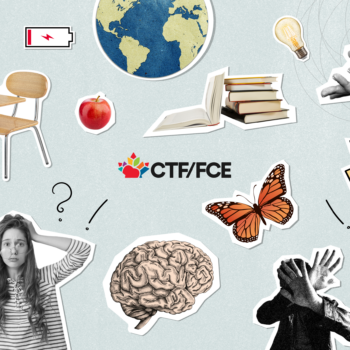Educator Well-Being and Pandemic Recovery: Supporting the Mental Health of Teachers and Education Workers
Over the last three years, the Canadian Teachers’ Federation (CTF/FCE) has documented the effects of the pandemic on teacher and education workers’ mental health and well-being. In 2022, in collaboration with research partners at the Centre for Addiction and Mental Health (CAMH) and the University of Ottawa, the CTF/FCE secured $800,000 from the Public Health Agency of Canada (PHAC) for a research pilot project on educator mental health and well-being in the context of post-pandemic recovery. The project timeline was December 2022-March 2024.
This project tested the feasibility of implementing a mental health intervention in three pilot school sites to address educators’ post-pandemic mental health. It included an intervention program, a baseline school-level survey, and a post-program evaluation.
Objectives
- Promote mental health and prevent mental illness for K-12 education workers in the context of pandemic recovery.
- Build evidence on the effectiveness of a collegial, peer support model to promote mental health knowledge and access to mental health services.
- Enhance the capacity of individuals, whole staff, and school leaders to address mental illness and trauma, while supporting whole school mental health and wellbeing through a trauma-informed lens.
Findings
Between September 2023 and February 2024, 52 staff members from 3 schools across Canada participated in five mental health learning sessions and an online discussion forum (“intervention”).
Baseline data showed:
Anxiety – Nearly 40% of staff were likely to have a Generalized Anxiety Disorder (37%), based on a standardized questionnaire (GAD-2).
Depression – Almost 20% of school staff felt down, depressed, or hopeless more than half or nearly every day (17.4%) and were likely to have clinical depression (18.8%), based on a standardized questionnaire (PHQ-2).
Post-Traumatic Stress – Over 20% school staff had some symptoms of post-traumatic stress disorder (PTSD) (21%), based on a standardized questionnaire (PCLC).
Overall mental health – The majority of school staff agreed or strongly agreed that the demands of their job had a negative impact on their mental health (56.5%) and nearly 30% of school staff rated their overall mental health as fair or poor (29.2%).
Given the short period of follow-up for this study (14 months), it is unsurprising that no statistically significant change was noted in the rates of anxiety, PTSD, and depression, nor in participants’ self-assessment of their own mental health.
However, significant improvements were observed in the precursors to behavioural change (participants’ knowledge and skills about the topics covered), including compassion fatigue, burnout, trauma-informed practice, and resilience.


A summary report as well as a full research report will be available in Fall/Winter 2025-2026.
To read more on the CTF/FCE’s mental health research, check out our Publication Catalogue.


